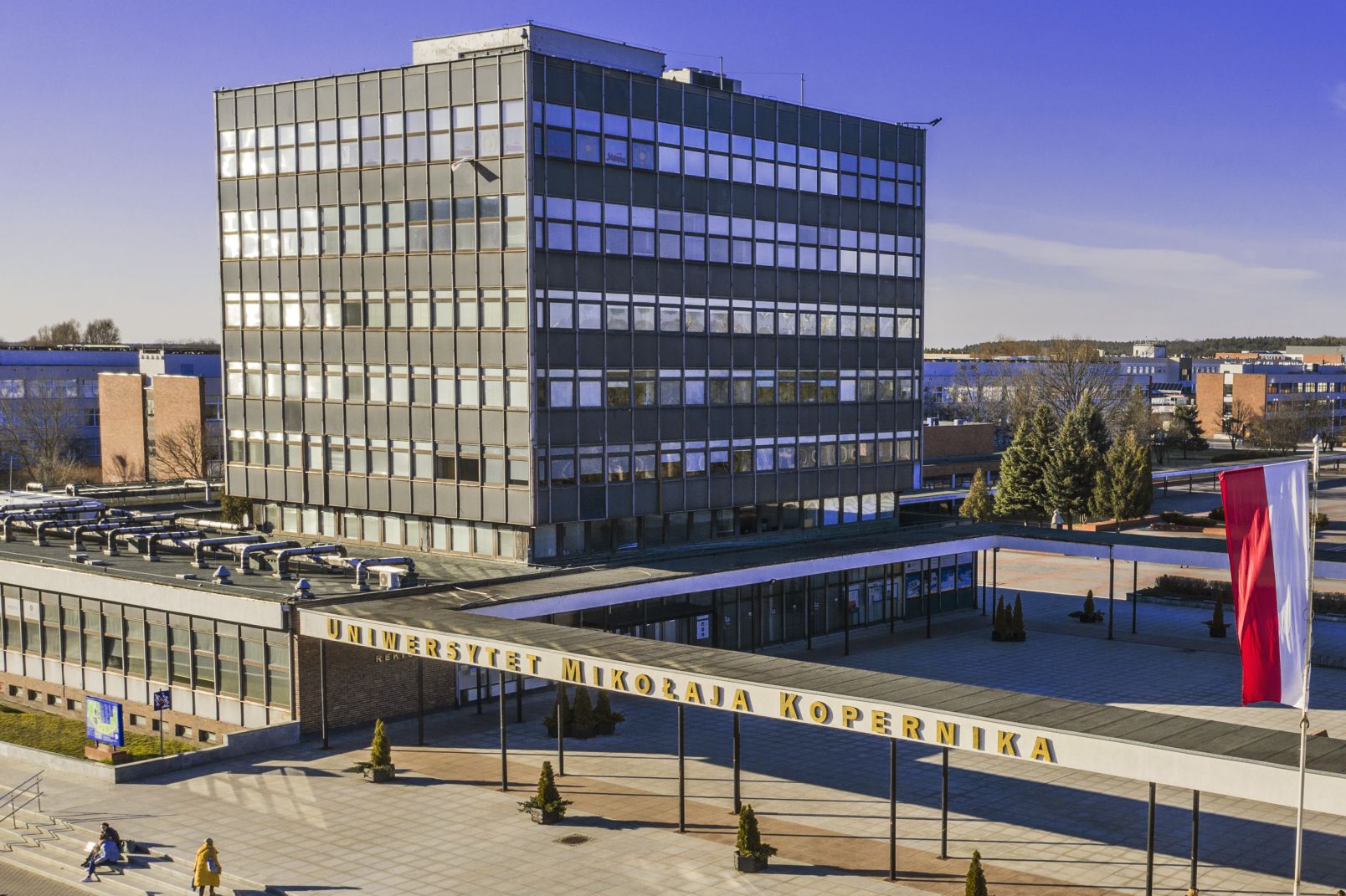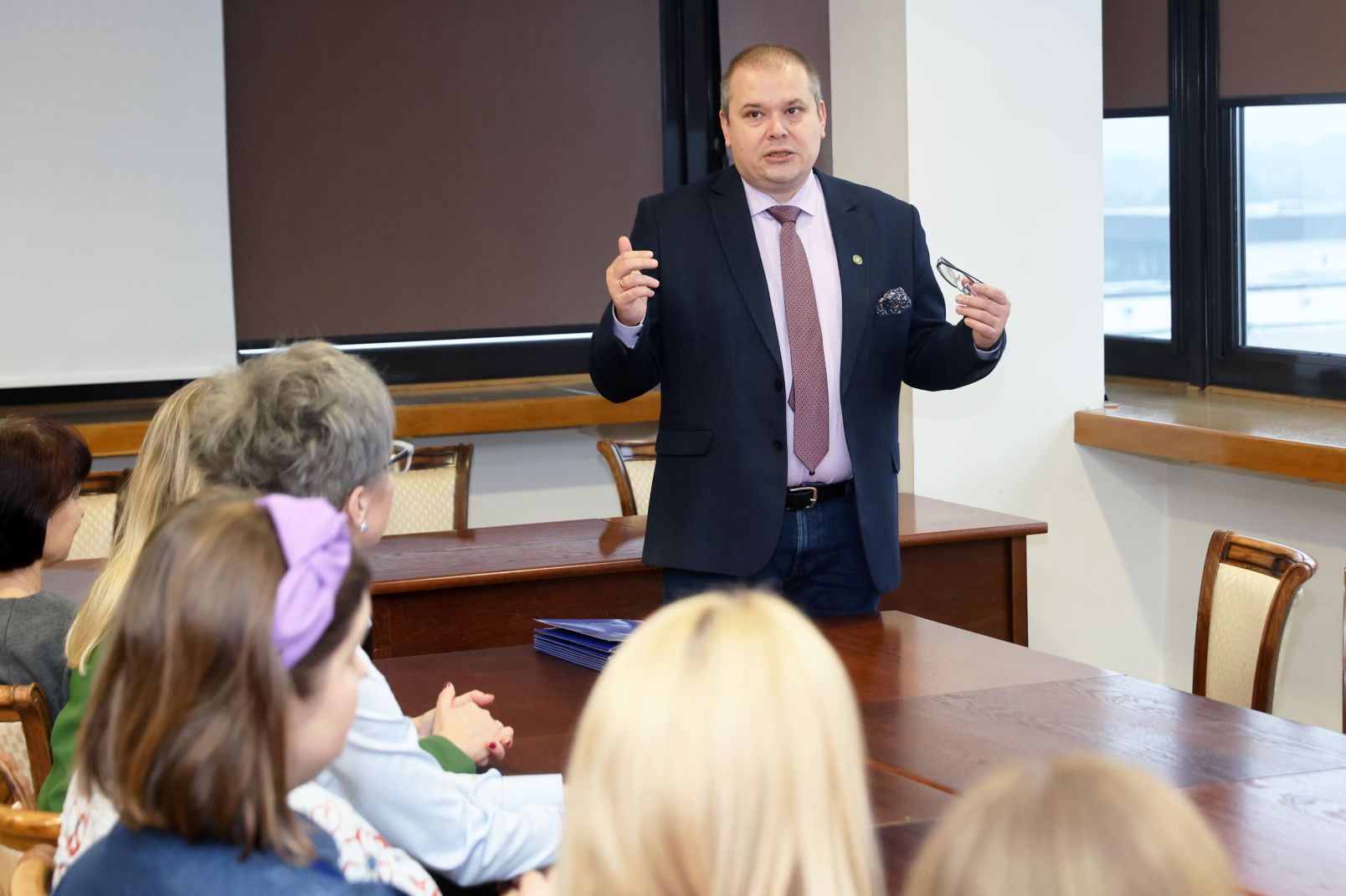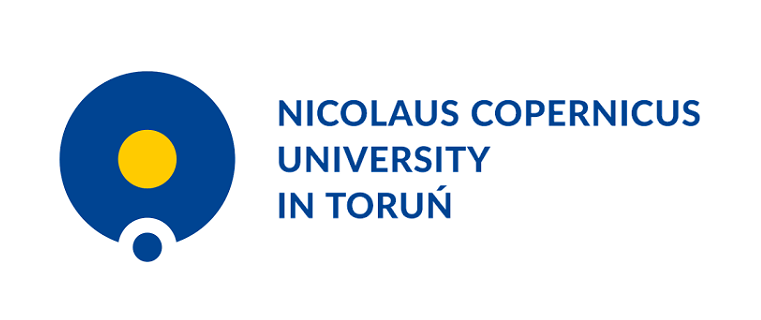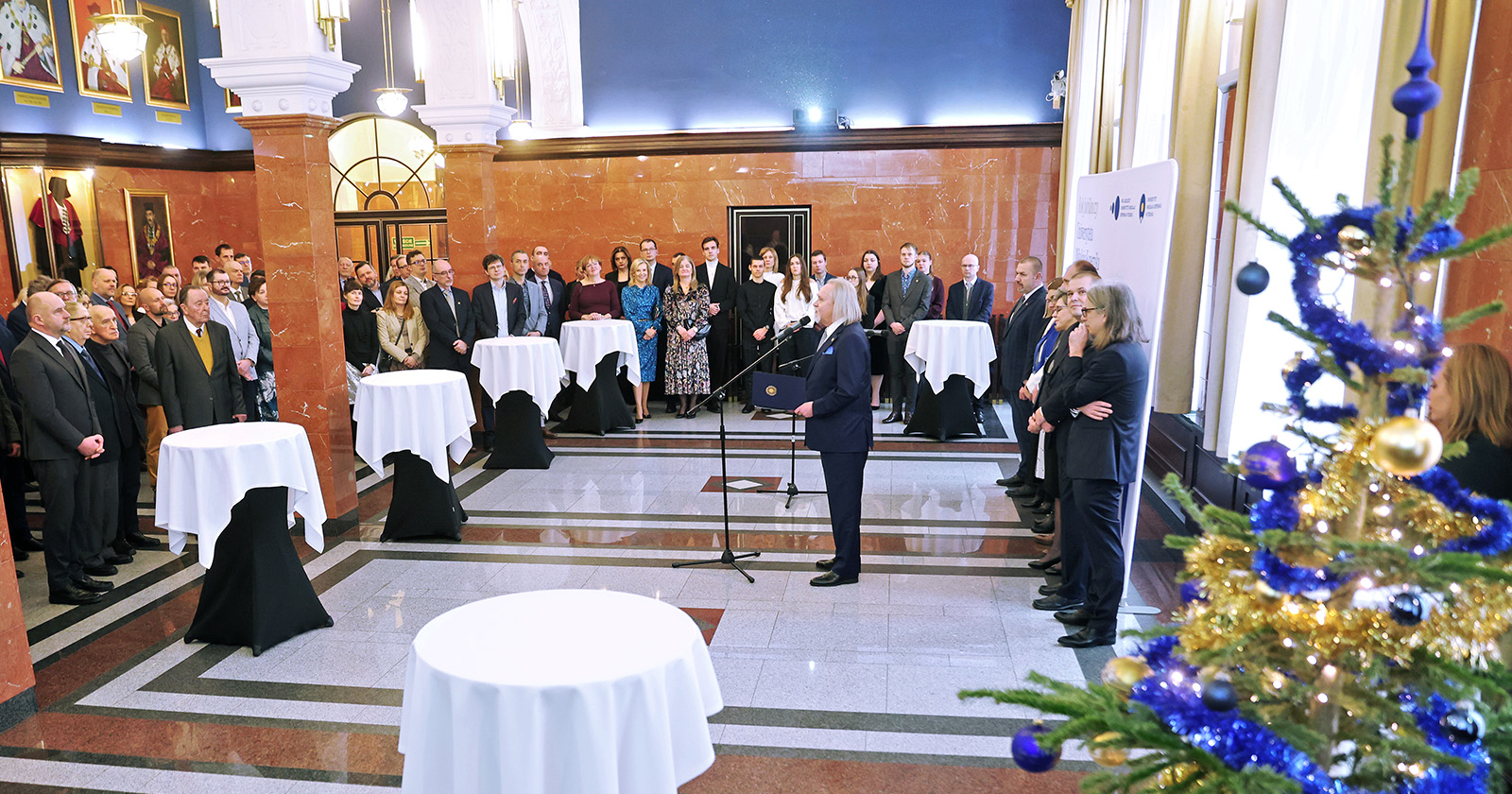A new beginning for the University administration
- In certain key areas of the University's strategic operation, i.e., science, teaching, staff and student affairs, the administration should be integrated so that it is a smoothly functioning organism - dr habi. Radosław Sojak, NCU Prof., Vice-Rector for Human Resources and Financial Management talks about the changes to the University-wide administration.
On 10 December 2024, Order No. 231 of the Rector of the NCU in Toruń on organisational changes in the university administration came into force. It provides for the abolition of the so-called one-person managerial positions and the merging of some of the existing departments into larger units connected with each other in terms of the relevant matters. At the beginning of the year, the Department of Human Resources was created on the basis of, among others, the Departments of: Human Resources and Social Services, as well as the Research and Project Support Department created by merging, inter alia, the Departments: Structural Funds Management, Research and the Initiative of Excellence – Research University Secretariat. At the beginning of March, the Department of Education will begin functioning, consisting of today's Departments of: Admissions and Student Affairs and Education.
Marcin Behrendt: We begin the new year with a major change in the functioning of the university administration.
Vice-Rector for Human Resources and Financial Management dr habil. Radosław Sojak, NCU Prof: - Before I answer, let me tell you a little story, I was talking to a man who is involved in the introduction of IT systems for airports. He said that as a company they have a certain product prepared that they just sell. Over time this product breaks down, there are all sorts of frictions and the IT people at each airport sit down and patch up the holes to keep the system running. The result is that when the software developers arrive a few years later, they don't recognise it. They can't do anything with it because the number of patches that have built up in the meantime is so high that they don't understand the architecture of the system. My impression is that it is the same with university administration, or administration in any large institution. Its way of organising itself is largely reactive to what happens to the University. And a lot of non-standard things have happened in recent years, because it's not every day that a new higher education law is introduced, it's not every day that a statute is amended. In addition to that, there has been a whole bunch of small changes within the administration itself, related to personnel decisions, transfers, new responsibilities and so on. It seems to me that, from time to time, such a new beginning, which puts things in order, is very necessary, and sometimes simply indispensable.
I think it is also worth looking at them from the perspective of new opportunities and benefits that usually escape somewhere with such a change.

photo Andrzej Romański
Employees say it is not a new beginning, but a revolution.
- I think this change is regarded as revolutionary mainly because it has consequences of an individual-personal nature, as well as those connected with the creation of new units and the abolition of so-called one-person management positions. However, let us look at administration from a slightly different angle and at a general level. Researchers have repeatedly described that sooner or later the administration tends to get locked into a kind of silos, to treat its fields of expertise as closed competence areas. It is very difficult to change such an approach, especially as it is usually not due to bad will or a lack of competence, but rather to various kinds of biases. So if there is no simple answer to the question of how to prevent silos from forming, then it is good to look at what these silos are, i.e. whether they cover the areas of expertise that are most strategic for the university. We want to implement a different model of work organisation at the University - one that allows staff to think not in terms of individual departments and their efficient work, but in terms of the whole of the University's key areas. I am very much in favour of administrative staff wanting to look at themselves as a single organism on which the smooth running of our University depends. This is an essential part of the philosophy behind this change.
As I understand it, you intend to repackage the silos.
- We see the necessity and the rightness of a procedural approach and are therefore keen to arrange the activities carried out in an appropriate, i.e. pragmatic, way. What is most apparent at the moment is a change consisting precisely of a slightly different 'packing' of the existing roles. However, the purpose of this change is much deeper. We want the main areas of expertise, administration, to have fairly homogeneous units, coherent departments that take each other's needs into account. This may sound complicated, so I will give my favourite example. From the perspective of some university procedures, the children of our employees are relevant insofar as they are added to the insurance of their parents employed at the NCU. On the other hand, from the perspective of e.g. social services, all children are relevant, including those who are not added to the parents' insurance. The effect of organising the administration in this area separately was that the human resources department collected information on some of the offspring and the social services department had to additionally collect information on all children. I assume that in the new system of organisation we will be able to change this and register all children. Similar examples in other areas of relevance can be multiplied. I therefore believe that once we are fully functioning in the new organisational structure, we will all see the benefits of this change.
Two things are noticeable in the Nicolaus Copernicus University Rector's Order on organisational changes in university-wide administration. The first is the abolition of so-called independent supervisor posts.
- Yes, the majority of these one-person management positions are staffed by people dealing with very important, even crucial aspects of the University. In our view, their functioning in teams is imperative. Why? Well, their unique knowledge and expertise should be naturally transferred to others. In the current formula, this is extremely difficult. The university is a truly unique institution. In at least some places, we need staff with competences and skills that we are unable to find on the labour market. If we look at academics in this way, we don't have the problem that the best specialist on some narrow research problem will not be replaced overnight. And just as we want professors to nurture their successors, we also want our excellent specialists in certain administrative areas to have the opportunity to pass on their knowledge to the team. So that, in the event of, for example, sick leave, holiday, some unforeseen circumstances, someone can take over their duties at a moment's notice. Accordingly, those who have held one-person managerial positions to date will be placed in special sections that will most likely require staff reinforcement in the next step to ensure the institutional memory of the University.
Since you mentioned staff changes …
- … you subtly want to ask me if there will be redundancies? No, there are no plans for redundancies. Although my experience as Vice-Rector is very short, only a few months, I have already come to realise that the frequency of the scare-monger, 'they will be sacking', is inversely proportional to the ease of sacking anyone from the university. Consequently, the statement that we will be making redundancies light-handedly is purely corridor gossip. On the contrary, we would like to encourage people with exceptional competence to work in university administration. On the other hand, the question remains whether the workload and staffing levels in all administrative units, and here I am not just talking about university-wide administration, are justified. We will certainly not react to possible overstaffing with redundancies, but at most with a proposal for redeployment, because we assume that people who know the university inside out have certain unique competences that are unlikely to be found on the labour market.
And the other thing that is striking?
The Department of Education is the only one that will be established only on March 1st.
- We did not want to make this change during the ongoing semester. It is possible that this will not be the only change in the administration effective from 1 March - we are constantly looking at the functioning of the University in different contexts. It is important to note that not all transformations are related to our internal policies, some of them are in response to certain external expectations of our University. We have the HR Excellence in Research award, we are in YUFE, YERUN, COAR and everywhere, in different areas, we have committed ourselves to a unified system of employee service or human resources management. Up to now, we have solved many problems through one-person managerial positions or several departments at the same time. As far as I can remember, there is only one university besides ours at the YUFE that has such widely dispersed personnel issues. The same applies to research. When we applied for the status of a research university, we made a commitment that we would bring about a certain integration of research project management, that there would be a project support office that would help not only to settle projects but also to prepare them. This has not been done in recent years. All ideas for solving this problem were either only half-hearted or not entirely satisfactory. In the mid-term evaluation of our research university project, although we were rated very highly, this deficit was pointed out. We therefore wanted to enter 2025 with some changes, especially as we will have the final evaluation of the project in a short while and will be able to show that we have nevertheless managed to fulfil some of the promises from the proposal in this area too.

photo Andrezj Romański
Will the same changes apply to the NCU Collegium Medicum?
- We are also planning changes at the Collegium Medicum, but we leave the final shape of these to our colleagues in Bydgoszcz. The borderline condition, which has been communicated to both the staff and the dean and rector authorities in the Bydgoszcz part of the university, is to move away from one-person managerial positions. In this respect, there can be no difference between campuses. On the other hand, there cannot be a full mirror image, for several reasons of which Toruń is often unaware. Some administrative departments at the Collegium Medicum are simply much smaller than those of a corresponding administration in Toruń. A fairly good example of this is in the field of research. The Research and Projects Department in Bydgoszcz, at the starting point, was not very large, although the needs were there. The University Centre for Clinical Research Support (for the management of medical projects) has just been set up and we have received external funding for its establishment. As a result, the area of research in Bydgoszcz has been supported in a way (at least for the moment) that meets the needs. We will certainly aim to propose a similarly pragmatic change in the Bydgoszcz administration in important areas of expertise.
The model of university-wide administration in operation since January 1st is the only one you have considered?
- When employees ask me why we have decided on this kind of change, I firstly point out that a similar course of change has already taken place at our University, just from a slightly different angle. A few, perhaps a dozen years ago, there was an idea to do an integration of similar areas of expertise, but not by merging units, but by appointing administrative directors to integrate the functioning of multiple departments. However, this solution has not worked for several reasons. Firstly, the directors have not been equipped with sufficient competences to realistically coordinate the work of the areas of expertise, and secondly, the audits we have show that this change has only led to the introduction of an additional level in the administrative structure (i.e. it has sanctioned existing silos, creating successive steps in any decision-making, rather than integrating and building a sense of moving towards a common goal). We are going the other way, in our view, with a longer-term, more collaborative effect - rather than leaving existing departments and putting administrative directors above them, we are creating large departments divided into sections.
Why should this solution be better?
- Sections, from the perspective of our organisational rules and a certain administrative practice, are a very good solution. They can be two or a dozen people, it is a very flexible cell. It may or may not have a manager. If we create even many sections, it does not mean that suddenly there will be many new managers. This is important because some of these sections are small in number. Such a small unit does not have to have a manager, and even if there is someone managing it, according to the regulations, in a team of up to five people the manager is not entitled to a function supplement. In financial terms, such an operation is therefore justified. Sections are relatively easy to set up, allowing us to react to the situation on the ground. In each of these large departments, a section is also created to deal with IT issues. In fact, in the near future we are facing a revolution in the documentation circulation and archiving issues: e-delivery, electronic student file, electronic diplomas, electronic portfolio and an employee self-service portal. In summary, this solution is better for reasons of its flexibility and its ability to respond to changes due to external factors. I feel that for most staff, this change will either be imperceptible or beneficial in that it will be much easier to make decisions that will make everyone's job easier. And I would very much like to ask staff to give me their trust in this - realising that change is usually difficult and it takes time to see the good side of it.
IT specialists will certainly have plenty to keep them busy.
- In terms of the workforce, we need people who, on the one hand, are IT specialists and, on the other, know their field of activity very well. It is extremely difficult to find a good IT specialist on the labour market, it is extremely difficult to find a good HR specialist, but it is virtually impossible to find someone who knows both. As we employ such people, we want them to share their experience with more people. Please note that an IT section is being set up in the payroll area, where there is no integration of departments, precisely because we need it to tie in certain IT issues relating to the electronic circulation of information and documents.
However, there is criticism that this change is being carried out without a thorough audit or analysis.
- True, we did not do an additional audit. The implication is that we would have had to postpone this change for at least a year and a half, because that is how long it would have taken to do an in-depth analysis, and as I mentioned, at least because of the upcoming evaluation of the research university project, we did not want to postpone this change. On the other hand, during the election campaign we visited all the faculties and met with all the staff groups, and the conclusions of these meetings turned into just such a need for change. There was not a single meeting in which staff did not raise concerns about the functioning of the University administration. However, a total of 22 meetings with all representatives of the University community means something. We are very keen that the administration's employees are seen through the prism of their knowledge and competence, and not just through what doesn't work - all the more so as I am convinced that this 'doesn't work' has often resulted precisely from an overly compartmentalised and rigid work organisation.

photo Andrzej Romański
Are there any modifications planned to the vice-rectors' duties as a result of these changes?
- There are no fundamental changes. There was a question of the reporting subordination of the team of legal advisers, because it is regulated by the Act on the Legal Profession, and of the Occupational Health and Safety team also because of national regulations. In the end, both these sections came under the direct authority of the Rector.
Do you give yourself a set period of time to see how the administration functions in the new formula and to modify the Order if necessary?
- Every change is perceived negatively at first, because it is unsettling, because we do not know what the end result will be. However, more often than not, after some time, people cannot imagine returning to the initial state. No matter how much they opposed the change. Of course, I think that in the middle of the term it the time will come to evaluate the functioning of the administration in the new structure. This will also be linked to the fact that we are facing a modification and a new round of evaluations of so-called non-academic staff. The work of those employed in the university-wide administration takes place on two levels: on the one hand, they are the governing authorities of the university, and on the other, the university community as a whole. We know what this relationship looks like from our perspective, but we are very keen to hear the opinion of others - so we will be listening to more people who have a different kind of contact with the university-wide administration than we do. We will also listen carefully to the people affected by this change. What I would ask staff to do at this point is to look at the proposed changes with a kind of curiosity. What I would like to assure everyone of is that we are very keen to improve the quality of everyone's work. If we approach the change with a desire to see the benefits in it, we will see them more quickly. I believe this change will result in the remaining staff looking at the University-wide administration in the way the administration should be seen, i.e. as extremely necessary and competent people working for the benefit of us all.
 NCU News
NCU News







 Campus life
Campus life
 Campus life
Campus life
